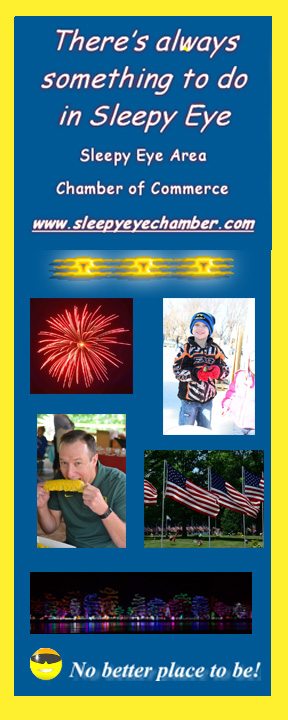Each of us will spend part of each day sleeping, eating, and basic chores. School or job consume time. If we have children or other caretaking responsibilities, those are necessary and will change through our lives.
That leaves not a lot of hours at our disposal. This is where we decide how much to be involved with the world out there. Here’s where I carve out time for church things and groups like the Food Shelf and Farmers Union. When the kids were around, I put in time chaperoning, coaching, selling concessions, all the stuff you sign up for when you have a kid.
These are our volunteer hours. We hope we are doing some good. Some of these activities we choose deliberately. Others are handed to us. Others grab us by the collar and won’t let go. Trying to save a golf course was one of those.
You might know I was involved with the attempt to preserve the golf course at Fort Ridgely State Park. It consumed a large swath of my life for 15 months. In the end, we lost. Oddly, I don’t regret the effort. If “life is a journey, not a destination,” this was an interesting side path.
A brief recap: March 2016, the Friends of Fort Ridgely board was told the 90-year-old golf course was closing. And there would be no discussion. Except a lot of us thought that was a bad idea. Months were spent trying to get a few people in St. Paul to change their minds. When that went nowhere, efforts turned toward local citizens operating the course. That was designed to go through the City of Fairfax at no cost to them. That plan crashed and burned when two City Councilors withdrew their support.
I am not much of a golfer. I like to say I am a good golfer if I don’t count the bad shots. But I had in mind golfing as I got older. I saw myself spending pleasant summer days walking nine holes at Fort Ridgely, trying to not lose too many balls. I felt like something was being taken from me. Beyond that, it just seemed senseless to destroy an existing asset that was in such wonderful condition.
I’m not sure exactly how I became so involved. There was a public meeting after the announcement where 120 people came to express their displeasure. I spoke out there. Soon I was getting calls from others of like mind. Gradually a group of us moved into the center of our large circle.
I think I speak for all of us in the fray, that we would not have kept on keeping on if we didn’t feel the support we did. Literally hundreds of people called or stopped me on the street to say they appreciated what we were doing. I’ve been involved in issues which meant working with two sides. Here, everyone was on our side. (Well, everyone except the few people who mattered.)
Pam will tell you that her primary view of me for weeks was walking through the house with a phone affixed to the side of my head. If cell phones cause brain cancer, I am doomed. I talked to government officials, legislators, reporters, radio stations, golfers, people who never held a club, old friends, new friends, and probably a few people who thought I was nuts.
Immediate appeals to powers-that-be fell on deaf ears, or closed ears. Where does one turn next? “Call your legislator,” was all I could think to tell people.
We are always told to “call your legislator.” And usually it doesn’t make a difference. It was heartening to see legislators of both parties rally with us. In an ultra-partisan political climate, we found an issue where there was no aisle. I will forever be grateful to Gary Dahms, Paul Torkelson, Clark Johnson, Kathy Sheran, Tim Miller, Andrew Lang and some I’m missing.
Some interesting philosophical discussions were ignited by our golf course. Where does power lie? Is it with citizens and our representatives? Or is it with agencies only distantly responsive to taxpayers? I’m afraid the answer to that is murky.
There were Friends meetings, committee meetings, public meetings, and meetings about meetings. Often the post-meeting was at the Frontier Bar in Fairfax. The story of the Revolutionary War can be told in the taverns of Boston and Philadelphia. The Frontier Bar became our Old South Meeting House.
People in the campaign came and went as schedules allowed and fervor waxed and waned. Looking back, it was invigorating to work with so many united to a singular cause. We constantly were picking each other up and dusting each other off. Any mention of names would be incomplete, but here are a representative few:
Loran Kardaal had lots going on in his life, but as they say, “If you need something done, ask a busy person.” Mark Tjosaas loves that state park more than anyone on Earth; it was his career and his avocation. Dan Brinkman wears his heart on his sleeve, and it’s a big heart. Same for Dave Nelson, who has given many days of his life to aiding Fort Ridgely.
Bernadette Herzog and Tom Otto got involved, each having spent hours on the course with friends and not wanting to let that go. They are extremely talented and had me believing that our little band of citizens could have succeeded at operating the course. In Fairfax, Marcia Seibert-Volz and Lois Gilles were a joy to work with.
In September, I was driving by Fort Ridgely one evening before dark. I decided to see what remained of the golf course. It was my first time there since being a volunteer-mower back in June when we still had hopes of saving it.
September had been rainy, and the course was green, albeit scruffy looking. If you squinted your eyes, it looked as if a couple days of mowing and “Let’s play golf!” Of course, that wasn’t the case. The perfect greens that were part of the two-million-dollar renovation were beyond repair. I sat on the bench overlooking the 8th hole, the signature hole with a deep ravine between the tee and the green.
My mind went back to a meeting in Fairfax. Ryan Braulick spoke eloquently and emotionally about time he had spent with his father there and time he hoped to spend with his young children.
I flashed back to my last day golfing there with Dan, Dave Mecklenburg, and Bedloe Eckstein. Butterflies flitted above the wildflowers bordering the fairways. Bluebirds and swallows darted here and there. The golf was secondary to the nature, yet part and parcel to it.
I wondered if it was silly to feel sad. I thought I’ve had less rational emotions. I wished I was golfing with Ryan and Dan and Dave and Bedloe instead of sitting among the overgrown grass and weeds.







